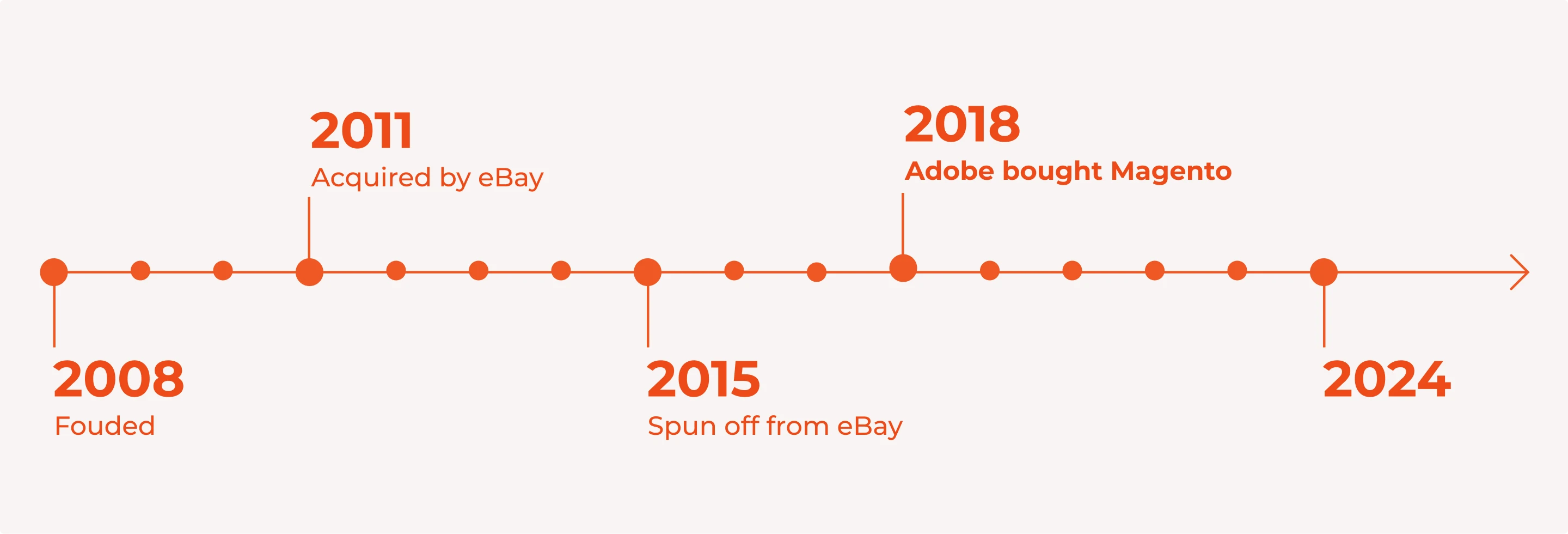Magento Purchased by Adobe
Magento has left a notable mark in the e-commerce industry. From its inception, it empowered businesses of various scales to create compelling webstores, offering a compelling suite of features and unparalleled flexibility. However, the acquisition of Magento by Adobe has sent ripples through the industry, prompting many to question the implications of this strategic move.
But when exactly did Adobe acquire Magento, and what implications does this hold for its future? Let's investigate the causes and consequences of this acquisition to attain a deeper understanding of its importance.
Background of Magento
Before we dive into the details of the Magento acquisition, it's essential to learn more about the roots of this platform. Founded in 2008, Magento rapidly emerged as a powerhouse in the e-commerce space, gaining loyal customers and an active community of developers and partners. Its open-source nature and extensive customization options have made it suitable for enterprises aiming to expand their digital presence quickly.

Who owns Magento?
Magento has undergone major ownership changes over the years. Originally developed by Varien Inc., Magento was later acquired by eBay in 2011. Subsequently, it became an independent company once again when it was spun off from eBay in 2015.
The independence from eBay marked a new chapter for Magento, enabling it to forge partnerships and collaborations with other technology companies to widen its reach and capabilities. During this period, Magento strengthened its position as a leading e-commerce platform, attracting attention from various industry players.
Adobe's Acquisition of Magento
The turning point came when Adobe announced the purchase of Magento. This strategic step filled a crucial gap in Adobe's Experience Cloud, providing the missing piece of a puzzle that caters to B2B and B2C markets. Adobe’s acquisition of Magento positions it as a valuable addition to Adobe's suite of digital marketing tools, offering consumers the ability to complete their digital transactions within a thorough ecosystem.
When did Adobe acquire Magento?
Adobe's acquisition of Magento was announced on May 21, 2018. The deal was finalized on June 19, 2018, marking a significant milestone in both companies' histories.

How much was Magento sold for?
The acquisition cost Adobe approximately $1.68 billion in cash, demonstrating the substantial value that Magento held in the e-commerce market.
Why did Adobe buy Magento?
Adobe's decision to acquire Magento was driven by its strategic vision to enhance its Experience Cloud suite. By integrating Magento Commerce into the set of digital marketing solutions, Adobe aimed to furnish an all-in-one platform for merchants to establish, operate, and refine their online presence across various channels.
Magento's powerful e-commerce features, combined with Adobe's solid proficiency in marketing and customer experience management, presented a compelling value proposition for companies looking to improve buying experiences for their clients.
Was the Adobe acquisition successful before 2024?
The acquisition of Magento by Adobe has been widely regarded as successful, with both companies leveraging their strengths to utilize innovations and bring more value to customers. Since the acquisition, Adobe has sustained investments in Magento's development, enhancing its capabilities and integrating it more closely with its vast suite of digital experience solutions.
What has changed since the purchase?
Since Adobe acquired Magento, it has experienced numerous remarkable changes. One notable alteration is the rebranding of Magento Commerce as Adobe Commerce, aligning it more closely with Adobe's products and emphasizing its role within the broader Adobe Experience Cloud.
Additionally, Adobe has introduced various enhancements and integrations for enterprises to offer exceptional e-commerce services. These include numerous integrations with Adobe's Marketing and Analytics Cloud, and optimization of performance, scalability, and security.
Impact of the Magento Acquisition by Adobe
The acquisition solidified Adobe's position in the e-commerce arena and intensified the competition with industry giants like Salesforce. With Magento now under its belt, Adobe stands poised to challenge Salesforce's dominance in cloud-based marketing, sales, and service offerings. Brent Leary, the founder of CRM Essentials, highlights the strategic significance of this acquisition for Adobe, emphasizing how Magento's e-commerce capabilities complement Adobe's existing digital marketing tools.
Furthermore, this deal improved the relationship between Adobe and Microsoft, as both companies vie for market share against Salesforce. This strategic alignment underscores the dynamic shifts in the e-commerce landscape, as companies seek to consolidate their offerings and strengthen their competitive edge.
What is the further development of Magento 2 Adobe Commerce?
The future development of Adobe Commerce is poised to keep progressing in line with Adobe's broader strategic objectives. This includes further integration with Adobe's Experience Cloud, and constant enhancements to keep up with the advancing needs of merchants and customers in an increasingly digital and interconnected world.
By benefiting from Adobe's resources, expertise, and technology, Magento is well-positioned to remain one of the most popular online trade platforms, enabling enterprises to spur expansion, nurture customer allegiance, and provide outstanding digital engagements across all interaction points.
Conclusion
Adobe's acquisition of Magento marks an important milestone in the evolution of online commerce. By comprehending the background and implications of this acquisition, we obtain invaluable perspectives into the forces shaping the future of Magento Commerce and the broader e-commerce landscape. As Adobe continues to invest in the growth of Adobe Commerce, its users can expect to benefit from a solid and integrated platform that empowers them to thrive in an increasingly competitive digital landscape.
FAQ
Why did Adobe acquire Magento?
Adobe aimed to bolster its digital commerce offerings, integrating Magento's robust platform with its suite of digital experience solutions.
How did the acquisition of Magento by Adobe impact users?
Users have seen enhanced capabilities, including seamless integration with Adobe's other products, improved scalability, and expanded support services.
Will there be changes to the pricing of Magento after purchase by Adobe?
While there have been adjustments, Adobe remains committed to providing flexible pricing options and ensuring a smooth transition for existing users.
What are the benefits of Magento being part of Adobe?
Users can leverage broader features for managing digital experiences, including marketing automation, B2B transactions, and content management.
Is Magento still an open-source platform?
Magento remains open-source, but with added support and resources from Adobe, empowering developers and businesses to create innovative e-commerce solutions.
